January 24, 2021:
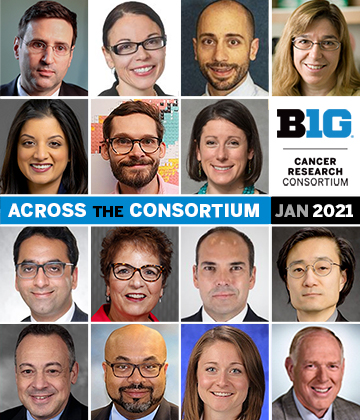 In this month’s Across the Consortium, the Big Ten Cancer Research Consortium highlights emerging research, new appointments and initiatives that support advancement in the health and treatment of those with cancer.
In this month’s Across the Consortium, the Big Ten Cancer Research Consortium highlights emerging research, new appointments and initiatives that support advancement in the health and treatment of those with cancer.
January 24, 2021:
 In this month’s Across the Consortium, the Big Ten Cancer Research Consortium highlights emerging research, new appointments and initiatives that support advancement in the health and treatment of those with cancer.
In this month’s Across the Consortium, the Big Ten Cancer Research Consortium highlights emerging research, new appointments and initiatives that support advancement in the health and treatment of those with cancer.
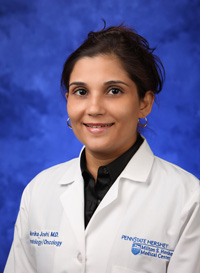
January 8, 2021:
Monika Joshi, MD, MRCP, associate professor of medicine at Penn State College of Medicine and a medical oncologist at Penn State Cancer Institute, has been appointed as the chief scientific officer of the Big Ten Cancer Research Consortium. She succeeds Ruth O’Regan, MD, who now serves as chair of the Department of Medicine at the University of Rochester.
The Big Ten CRC announced Dr. Joshi’s appointment during the consortium’s Virtual Summit on January 8. She will serve a three-year, renewable term in her new role.
“I’m excited and very honored to be appointed as the CSO for the prestigious Big Ten Cancer Research Consortium,” Dr. Joshi said. “I want to thank my predecessor, Dr. O’Regan, who has done a wonderful job for the Big Ten CRC. Our hope is that we will continue to build upon the growth of the consortium. I also want to thank the Big Ten CRC administrative team and the cancer center directors for placing their trust in me. Additionally, I am grateful to my mentors and my family, who continue to support my career growth.” Read More
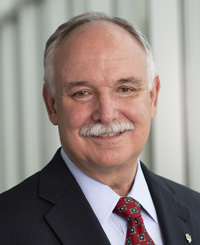
January 8, 2021:
The Big Ten Cancer Research Consortium (Big Ten CRC) honored Indiana University and Patrick J. Loehrer, Sr., MD, director of the Indiana University Melvin and Bren Simon Comprehensive Cancer Center, with two new awards during the Big Ten CRC Virtual Summit, hosted by the Cancer Center at Illinois, on Friday, January 8.
The Big Ten Cancer Research Consortium Institutional Leadership Award is a new award that will be presented annually to the member institution that provides the greatest overall contribution to the success of the Big Ten CRC. The award is given to the institution that led all member institutions in combined Clinical Trial Working Group participation and patient enrollment on Big Ten CRC clinical trials during the past year.
“Under the leadership of Pat Loehrer and his team, the IU Simon Comprehensive Cancer Center has championed one of the main goals of every cancer center — applying cancer research to patients as rapidly as possible,” said Howard Bailey, MD, director of the University of Wisconsin Carbone Cancer Center, and chair of the Big Ten CRC Cancer Center Directors. “Their leadership and contributions to the Big Ten Cancer Research Consortium are a key aspect of our current success.”
The second award is the Pat Loehrer Award for Exemplary Collaboration in Cancer Research, which will be presented annually to an individual researcher who best demonstrates collaboration within the Big Ten CRC, as determined by Big Ten CRC leaders. Dr. Loehrer, whose vision and leadership were key in the Big Ten CRC’s establishment and continued growth, was chosen for the inaugural award named in his honor. Read More
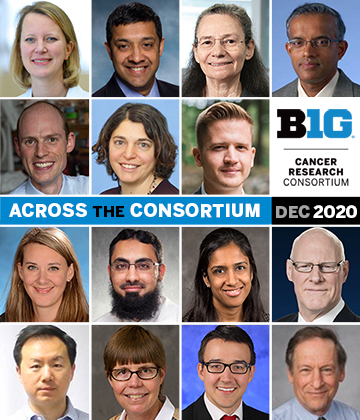
December 28, 2020:
In this month’s Across the Consortium, the Big Ten Cancer Research Consortium highlights recently published research, grants, professional appointments, oral presentations, and developments in basic scientific research across Big Ten cancer centers and universities. Stay current on what’s happening within our Big Ten universities. Read More
December 23, 2020:
 In a recent holiday post on his blog Holden the Line on Cancer, George Weiner, MD, director of the University of Iowa Holden Comprehensive Cancer Center, reflects on the resilience, creativity, and enduring commitment that has kept research collaborations strong throughout this tumultuous year. As one example, Dr. Weiner writes about the newly introduced Big Ten CRC Grand Rounds:
In a recent holiday post on his blog Holden the Line on Cancer, George Weiner, MD, director of the University of Iowa Holden Comprehensive Cancer Center, reflects on the resilience, creativity, and enduring commitment that has kept research collaborations strong throughout this tumultuous year. As one example, Dr. Weiner writes about the newly introduced Big Ten CRC Grand Rounds:
“One of the primary goals of an academic cancer center is to train the next generation of cancer clinicians and researchers. Our approach to such education has been changed, but not halted, by the pandemic. I continue to have weekly meetings with my research group by Zoom. In fact, my clinical research colleagues are more likely to participate virtually in these meetings now since they can do so from their offices or clinic and don’t have to walk to the other side of the medical center. I continue to meet weekly with graduate students in my laboratory. This has worked fairly well. It has become a standing joke that just about every Zoom meeting starts with a graduate student asking me to ‘enable screen sharing’ so we can review their data and plans together. Grand rounds and other conferences including tumor board discussions are held virtually as well. Not ideal but it works. As we all have gotten used to virtual conferences, we realized such meetings don’t need to be limited to a single institution. Holden suggested and organized the first Big Ten Cancer Research Consortium Grand Rounds that is a virtual meeting now held monthly. Typical attendance over the past few months has included around 100 researchers from multiple institutions. New collaborations between cancer centers in the Big Ten are starting to emerge from these discussions. Hopefully Big Ten Cancer Research Consortium Grand Rounds will continue post-pandemic and be seen as a silver lining that emerged from this very difficult time.” Read More
December 15, 2020:
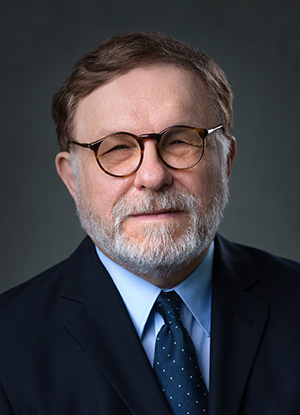 After more than 20 years in cancer research, Borys Hrinczenko, MD, PhD, sees a bright future. As a lung cancer specialist at the Michigan State University Breslin Cancer Center, he has led numerous clinical trials and helped pioneer new therapies, including checkpoint inhibitors, harnessing the body’s immune system against lung cancer. Twenty years ago, he could offer his lung cancer patients few viable treatments.
After more than 20 years in cancer research, Borys Hrinczenko, MD, PhD, sees a bright future. As a lung cancer specialist at the Michigan State University Breslin Cancer Center, he has led numerous clinical trials and helped pioneer new therapies, including checkpoint inhibitors, harnessing the body’s immune system against lung cancer. Twenty years ago, he could offer his lung cancer patients few viable treatments.
More recently, “I’ve had patients who have done quite well” on checkpoint inhibitors, Hrinczenko said. That includes a small group of long-term survivors with advanced lung cancer.
He expects more breakthroughs as the Breslin Cancer Center looks forward to moving into a new hospital in early 2022 now being built by McLaren Health Care in partnership with MSU and adjacent to the East Lansing campus. Breslin is reorganizing its clinical trials office to improve efficiency and forming alliances with several other cancer groups, including the Karmanos Cancer Institute, which is part of McLaren.
MSU’s membership in the Big Ten Cancer Research Consortium (Big Ten CRC) is a key to that bright future. Hrinczenko is a member of the Consortium’s Steering Committee and its Thoracic Clinical Trial Working Group. He is an associate professor in the MSU College of Human Medicine and director of the Hematology and Oncology Fellowship Program. Read More
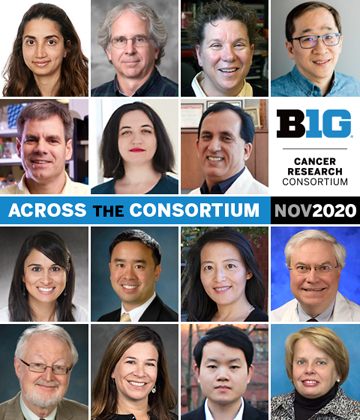
November 16, 2020:
In this month’s Across the Consortium, the Big Ten Cancer Research Consortium highlights several new research studies, study publications, grant awards, professional appointments, and an endowment established to support cancer research. Learn what’s happening across the Big Ten CRC. Read More
November 3, 2020:
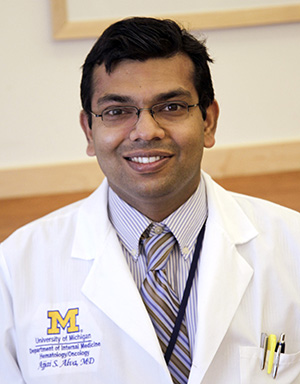 This month, the Big Ten Cancer Research Consortium highlights the University of Michigan Rogel Cancer Center as our featured member. Rogel Cancer Center member Ajjai Alva, MBBS, is an associate professor of hematology/oncology and member of the Big Ten CRC’s Genitourinary Clinical Trial Working Group. He has participated in four Big Ten CRC trials with a few more in the pipeline. Dr. Alva shares why he is glad to be part of the Big Ten Cancer Research Consortium.
This month, the Big Ten Cancer Research Consortium highlights the University of Michigan Rogel Cancer Center as our featured member. Rogel Cancer Center member Ajjai Alva, MBBS, is an associate professor of hematology/oncology and member of the Big Ten CRC’s Genitourinary Clinical Trial Working Group. He has participated in four Big Ten CRC trials with a few more in the pipeline. Dr. Alva shares why he is glad to be part of the Big Ten Cancer Research Consortium.
“Cancer Research is evolving rapidly with major new advances and that’s great news for patients. From a researcher perspective, the fast-changing landscape makes it critical to get new trials up and running fast and to get them completed fast as well. Otherwise, we run a real risk of the study being outdated and irrelevant. The consortium provides a great platform of outstanding experienced institutions and investigators to do cutting-edge and fast-paced studies. The Administrative Headquarters team is outstanding, highly professional, and very responsive to site and investigator needs and ever ready to assist. Read More
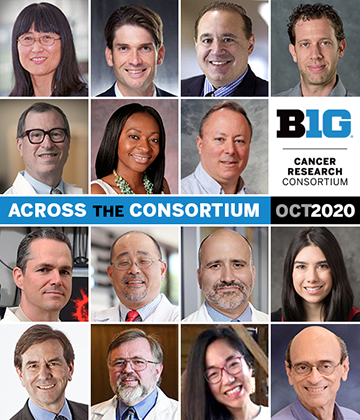
October 23, 2020:
In this month’s Across the Consortium, the Big Ten Cancer Research Consortium (Big Ten CRC) highlights a variety of activities and accomplishments across Big Ten universities. Highlights include new leadership announcements, grant awards, study publications, and novel treatments to continue the fight against cancer. Read More
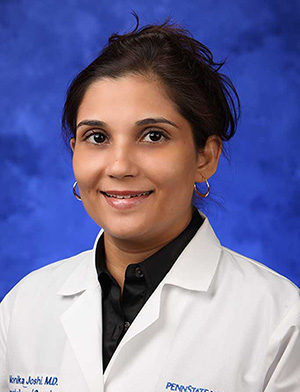
October 1, 2020: Excerpt reposted with permission from the Erie Times-News.
The Big Ten is best known for football.
But in 2013, member universities teamed to collaborate rather than compete, in cancer research.
The Big Ten Cancer Research Consortium, based at the Hoosier Cancer Research Network in Indianapolis, Ind., helps researchers at 15 universities work together to fight cancer. The consortium includes the Penn State Cancer Institute, Rutgers University Cancer Institute of New Jersey, and the University of Maryland Marlene and Stewart Greenebaum Comprehensive Cancer Center.
“The idea was to get all those football colleges and cancer institutes together to build a forum so that people from member institutions can conduct collaborative research and clinical trials,” said Monika Joshi, MD, who represents the Penn State Cancer Institute, located in Hershey, on the Big Ten CRC steering committee. Read More

© 2025 All rights reserved.
Big Ten Cancer Research Consortium
7676 Interactive Way, Suite 120, Indianapolis, IN 46278
Subscribe to the Big Ten CRC Newsletter X
X Facebook
Facebook YouTube
YouTube